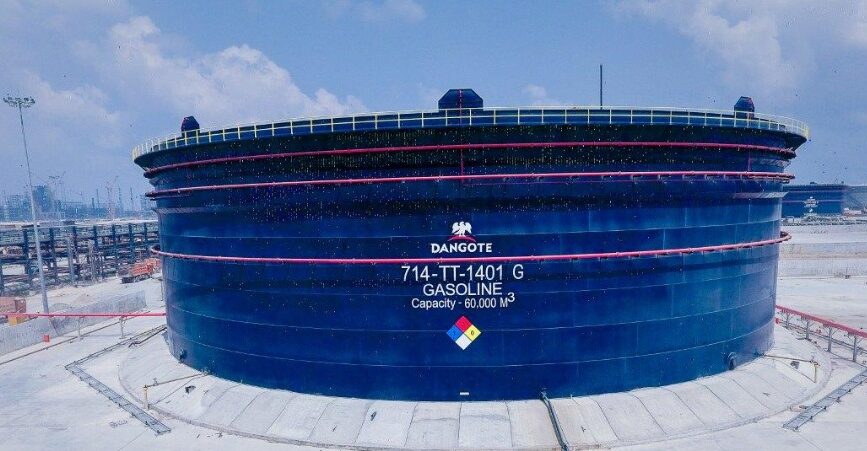BUSINESS

MARKETERS URGE DANGOTE REFINERY TO SET PETROL PRICE BELOW N800 PER LITRE
The Independent Petroleum Marketers Association of Nigeria (IPMAN) has urged the Dangote Petroleum Refinery to sell Premium Motor Spirit (PMS) at a price lower than the current N825 per litre being offered by the Lekki-based facility.
IPMAN’s Publicity Secretary, Chinedu Udadike, told our correspondent in an interview that the refinery has the capacity and favorable conditions to offer petrol at a cheaper rate than its present ex-depot price.
Udadike’s comments came in response to remarks made by Dangote Group President, Aliko Dangote, who credited the refinery for the steady decline in fuel prices, noting that Nigerians currently pay about 55% of what petrol costs in other West African countries.
Recently, Dangote also informed ECOWAS officials and President Bola Tinubu that the Federal Government’s naira-for-crude policy has positively influenced the pricing of refined petroleum products.
While agreeing that petrol prices in Nigeria are lower than in many neighboring West African nations, Udadike insisted that the cost should be even more affordable, suggesting a target price around N750 per litre.
He pointed out that most West African countries compared by Dangote neither produce crude oil nor operate refineries that process crude oil with local currency.
“I acknowledge that petrol is cheaper here than in other West African countries. However, those countries do not produce crude oil. Nigeria does. With the government supplying crude in naira to the refinery, many of the foreign exchange challenges have been eliminated. Therefore, Nigerians should benefit from significantly lower fuel prices,” he said.
Udadike praised Dangote for resolving the persistent fuel scarcity that led to long queues at filling stations, but emphasized that fuel prices could still be reduced. He called on the government to stabilize and strengthen the naira to help lower costs further.
“What Dangote has achieved for Nigerians is ensuring availability. But when the naira stabilizes and improves against the dollar, fuel prices will drop further. The exchange rate is a key factor in determining petrol prices,” he explained.
When asked if he believed Dangote’s petrol was still expensive, Udadike responded, “Given the infrastructure and favorable conditions, I don’t think the price is low enough. I estimate petrol could be priced around N770 per litre. Based on production and depot costs, petrol shouldn’t cost more than N780 or N750, especially considering the current exchange rate.”
He added that if the naira appreciates to about N1,100 against the dollar, petrol prices should fall below N750 per litre.
“The dollar currently trades around N1,600, but if it falls to N1,200, petrol prices at the pumps could dip below N750,” he noted.
Speaking last week to ECOWAS leaders, Dangote highlighted that many Nigerians were unaware they were paying just 55% of what other West African countries pay for petrol.
He noted that his refinery helped reduce petrol prices by selling at rates between N815 and N820 per litre.
During a visit by the President of the ECOWAS Commission, Dr. Omar Touray, and his team to the 650,000 barrels-per-day refinery, Dangote explained how the facility has contributed to lowering refined product costs across various sectors of Nigeria’s economy.
“When we started diesel production last year, prices dropped sharply from N1,700 to N1,100, and have continued to fall since. This has positively impacted industries such as mining and agriculture,” he said.
Dangote stressed that local refining has benefited Nigerians by significantly reducing petrol prices compared to neighboring countries.
“In neighboring countries, petrol costs about $1 per litre (around N1,600), whereas at our refinery, prices range between N815 and N820. Many Nigerians don’t realize they are paying only about 55% of the regional cost,” he remarked.
During President Tinubu’s visit to the refinery on Thursday, Dangote reaffirmed that the naira-for-crude policy helped consistently reduce fuel prices. However, a recent report by S&P Global indicated that the refinery’s fuel prices remain relatively high despite falling crude prices.
As of the time of this report, Tony Chiejina, the refinery’s spokesperson, had not responded to IPMAN’s comments.
"This represents a significant development in our ongoing coverage of current events."— Editorial Board









